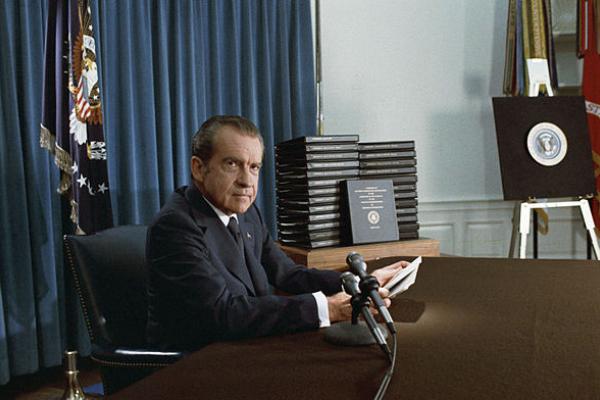Rarely is racism confessed so baldly.
John Ehrlichman, domestic policy chief for Richard Nixon, admitted in 1994 that the "war on drugs" was a way to "criminalize" the anti-war left and black people, and "disrupt those communities," according to a recent article from Harper's Magazine.
Ehrlichman was known as a close adviser to Nixon, and served 18 months in prison for his role in the Watergate scandal.
According to Harper's writer Dan Baum:
At the time, I was writing a book about the politics of drug prohibition. I started to ask Ehrlichman a series of earnest, wonky questions that he impatiently waved away. “You want to know what this was really all about?” he asked with the bluntness of a man who, after public disgrace and a stretch in federal prison, had little left to protect. “The Nixon campaign in 1968, and the Nixon White House after that, had two enemies: the antiwar left and black people. You understand what I’m saying? We knew we couldn’t make it illegal to be either against the war or black, but by getting the public to associate the hippies with marijuana and blacks with heroin, and then criminalizing both heavily, we could disrupt those communities. We could arrest their leaders, raid their homes, break up their meetings, and vilify them night after night on the evening news. Did we know we were lying about the drugs? Of course we did.
I must have looked shocked. Ehrlichman just shrugged. Then he looked at his watch, handed me a signed copy of his steamy spy novel, The Company, and led me to the door.
Erlichman's words are a harrowing confirmation of what writer Michelle Alexander argues in The New Jim Crow: Mass Incarceration in the Age of Colorblindness.
"Slavery defined what it meant to be black (a slave), and Jim Crow defined what it meant to be black (a second-class citizen). Today mass incarceration defines the meaning of blackness in America: black people, especially black men, are criminals. That is what it means to be black,” writes Alexander.
According to Erlichman, the Nixon administration explicitly intended to define black people as criminals. And today, African Americans represent only 12 percent of drug users, but 38 percent of those arrested for drug offenses, and 59 percent of those in state prison for a drug offense, according to the NAACP.
If Ehrlichman accurately captured the Nixon administration's intent, the former president would be quite pleased with his legacy.
Got something to say about what you're reading? We value your feedback!
